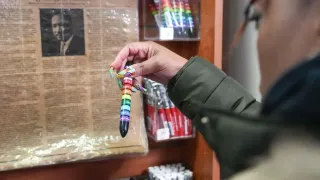May 31
Why Is Everyone Going Gaga over Luciano Plazibat?
READ TIME: 2 MIN.
Why is everyone (queers, especially) going gaga over Luciano Plazibat?
The delectably handsome and proudly queer dancer, choreographer and influencer recently won "Survivor Croatia." He recently posted a video of himself lip syncing to Lady Gaga's "Abracadabra" that has gone viral.
In the clip "Plazibat sings the chorus to "Abracadabra" while performing the choreography from the official music video. He's just sitting in a chair and talking to the camera," reports OUT Magazine.
The 26-year old made his first major television appearance on the Croatian edition of "Big Brother" in 2019 where he stayed for 57 days and gained a following due to his good looks, personality and dance moves.
He was the sole survivor on the Yellow team on the recently completed "Survivor Croatia" and says he got the strength and motivation from Lady Gaga's music-particularly her song "Abracadabra."
In the comments to the "Survivor Croatia" posting of the video, he writes: "Hahaha Gaga saved me during Survivor!😂 Thank you Mayhem 🖤🤣 we won!!"
Plazibat cites Gaga as a huge influence in ways he's overcome personal issues such as coming out in his not-so-queer welcoming homeland and overcoming his body dysmorphia issues. "They bullied me 'cuz of loving you and now I won!! Hihihi Survivor 2025!! We gave them CHAOS," he wrote on Instagram.
Fans have taken note of the large "Chromatica" design on his left thigh, paying homage to Lady Gaga's 2020 album.
Amongst his other achievements was performing alongside Albina at the Eurovision Song Contest in 2021. Plazibat has also collaborated with notable artists such as Dino Merlin, Milica Pavlović, and Severina, establishing himself as a prominent choreographer in Croatia.
Check out pics from his IG below:






